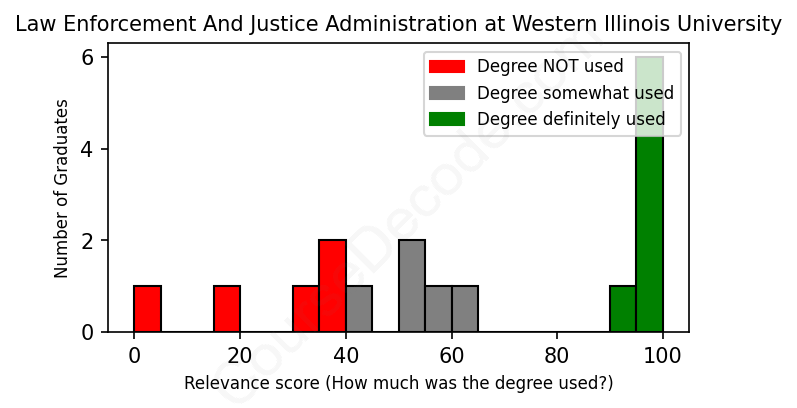
First, some facts. Of the Law Enforcement And Justice Administration graduates from Western Illinois University we've analyzed , here's how many have used (or NOT used) their degree in their career:

These are estimates based on AI analysis of 17 LinkedIn profiles (see below).
The verdict? Slightly below average. Overall, with an average relevance score of 63%, Law Enforcement And Justice Administration graduates from Western Illinois University have a slightly lower likelihood (-4%) of finding work in this field compared to the average graduate across all fields:
And for comparison, here's the chart for all profiles we've looked at across all degrees.
Also, after graduating, only 17% of these graduates have pursued further education other than another Bachelor's degree (such as a Masters degree or other), compared to the average across all profiles of 35%. This suggests a Bachelors degree is enough for most Law Enforcement And Justice Administration graduates, and it's normal to look for work straight after graduation.
See the details:
|
Relevance score: 91% We think this person has gone into a career highly relevant to their degree. We think this person has gone into a career highly relevant to their degree.
DEGREE INFOGraduated in 2011 from Western Illinois University with a Bachelor's of Science in Law Enforcement And Justice Administration. Also pursued further education since (see below). JOB HISTORY SINCE GRADUATIONLandscaping Assistant Foltz Landscaping 2011 - 2012 Police Officer  City of Monroe, Wisconsin Jun 2013 - Present FURTHER DEGREES DONE SINCE GRADUATINGPolice AcademyBlackhawk Technical College 2012 - 2013 ABOUTNo information provided. |
The top 10 most common jobs done by the graduates we've analyzed (ranked most common to least) are:
From the analysis, it's clear that a significant number of people who graduated with a degree in Law Enforcement and Justice Administration from Western Illinois University have pursued careers directly linked to law enforcement and criminal justice. Common roles include positions like Community Restitution Services Officer, Police Officer, Deputy Sheriff, and Pretrial Services Supervisor, all of which utilize knowledge and skills that were acquired during their studies, reinforcing their relevance and applicability to their academic background. These roles show a solid connection to the principles of justice, public safety, and community engagement, aligning well with the core objectives of their degree.
On the flip side, there are also numerous graduates who have entered fields less related to law enforcement. Positions like Claims Associate, Customer Care Representative, and even roles in logistics or IT support demonstrate a disconnect from the core competencies of legal and justice administration. While some of these jobs might utilize soft skills like communication and problem-solving, they don’t deeply engage with the criminal justice principles that the graduates studied. Overall, while many alumni found paths that resonate with their degree, there’s a noticeable portion whose career choices drift away from the intended field, showcasing a mix of relevance and disparity in their post-graduate professional journeys.
Here is a visual representation of the most common words in job titles for Law Enforcement And Justice Administration graduates (this is across all Law Enforcement And Justice Administration graduates we've analyzed, not just those who went to Western Illinois University):

Looking at the career trajectories of graduates from the Law Enforcement and Justice Administration program at Western Illinois University, it’s pretty clear that many of them tend to stay within the field relevant to their studies, especially in the early years after graduation. For those who graduated around 2010 to 2015, a significant number landed jobs in law enforcement or criminal justice positions fairly quickly. For instance, some started as community service officers, police officers, or worked in pretrial services. Others initially took roles that were somewhat related, like telecommunicators or in security roles, before transitioning into more specialized positions within law enforcement. Five to ten years later, many of these individuals advanced to supervisory or administrative roles, showing a clear upward trajectory in the field with a blend of experience in both practical law enforcement and administrative capacities.
On the flip side, there are graduates whose paths veered away from direct law enforcement roles. Some ended up in various fields unrelated to their law enforcement degree, like insurance or customer service. For example, a graduate who started off in claims at an insurance company moved into positions as a claims manager, which is far removed from their original pursuit in justice administration. This suggests that while many did find solid jobs related to their degree, others might have started in fields that didn’t capitalize on their education, possibly due to market conditions or personal interests changing over time. So, if you're eyeing this field, you'll likely find solid opportunities, but some may find themselves in unexpected places after a few years post-graduation.
Honestly, a Bachelor’s degree in Law Enforcement and Justice Administration at Western Illinois University is pretty manageable if you're dedicated and interested in the subject. It combines some challenging topics like criminal law, ethics, and administration principles, but it's not as tough as some other degrees can be, especially if you enjoy the material and stay on top of your studies. The coursework usually involves a mix of lectures, discussions, and some practical applications, but if you’re organized and willing to put in the effort, you’ll likely find it a rewarding experience rather than a super daunting one. Overall, it strikes a good balance—challenging enough to keep you engaged, but not overwhelmingly difficult.
Most commonly, in the LinkedIn profiles we've looked at, it takes people 3 years to finish a Bachelor degree in Law Enforcement And Justice Administration.
Based on the careers of these Law Enforcement and Justice Administration graduates from Western Illinois University, it seems like they’ve generally found steady work, but the pay likely varies quite a bit depending on their specific roles. For instance, those who went into police work or public service positions might be earning a decent wage, especially as they gain experience, but it's often not glamorous. Jobs in insurance or management usually offer better salaries, particularly for those in supervisory or managerial positions, like the Claims Manager or Chief Public Defender roles. Still, some of the earlier positions, like security officer or telecommunicator, might not pay as well right out of the gate. Overall, while some seem to be climbing the ladder to more lucrative positions, others might have a tough time making big bucks, especially early in their careers.
Here is a visual representation of the most common words seen in the "about" section of LinkedIn profiles who have a Bachelor degree in Law Enforcement And Justice Administration (this is across all Law Enforcement And Justice Administration graduates we've analyzed, not just those who went to Western Illinois University). This may or may not be useful:

Here are all colleges offering a Bachelor degree in Law Enforcement And Justice Administration (ordered by the average relevance score of their Law Enforcement And Justice Administration graduates, best to worst) where we have analyzed at least 10 of their graduates:
| College | Score | Count |
|---|---|---|
 Western Illinois University Western Illinois University
|
63 | 17 |